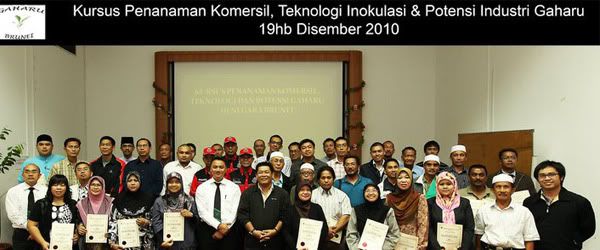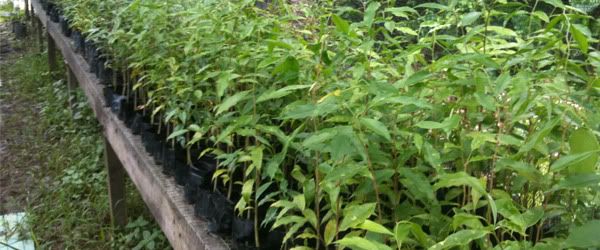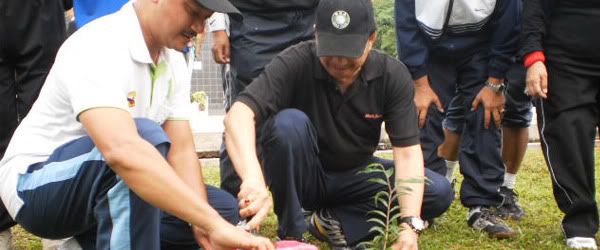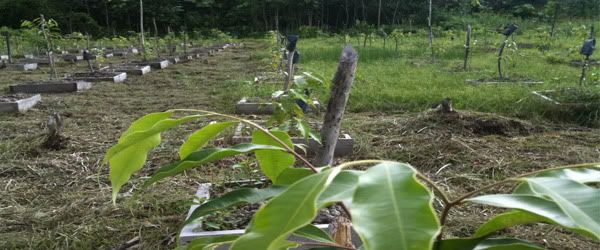Brunei to be biggest gaharu producer

(Above) Hj Mohamad Ali Hj Dollah (L), Gaharu Berjaya Resources Managing Director and Acting Rector Unissa, Pg Anak Dr Hj Amiruddin Alam Shah Pg Anak Hj Ismail (R) planting the gaharu seedling at Unissa's compound yesterday. Pictures:BT/Rasidah Bakar and BT files
Tuesday, December 14, 2010
Looking to supply 60% of world's demand
BRUNEI aims to supply 60 per cent of the gaharu (sandalwood) global demand to become its biggest producer, with local company Gaharu Berjaya Resources (GaharuBrunei) targetting to plant and harvest one million trees over seven years.
In an interview with The Brunei Times on the sidelines of a handover of gaharu trees to the Universiti Islam Sultan Sharif Ali (Unissa) yesterday, Hj Mohamad Ali Hj Dollah, GaharuBrunei managing director, said that the local company is actively promoting the commercialisation of the tree in all four districts of the Sultanate.
The tree's resin is used to manufacture oils, lotions or soaps. Young gaharu leaves can also be collected after a year and a half and turned to green tea . The product enjoys high demand in the Middle East, Taiwan and Japan.
"If our neighbour, Singapore, can gain US$1.2 billion a year (from this) despite the fact that they obtained the raw materials from outside and with the limited land, GaharuBrunei (has) the mission and vision to improve and increase the standard gaharu production in Brunei and South East Asia," Hj Mohamad Ali said.
The country' s land is suitable for planting gaharu trees, and the company has already planted 9,500 trees since February, he said.
However, "we have not been able to cater (to) all the demands".
"From 50 years ago, Asean countries can only supply 15 per cent of the total demand. (This is because) we do not have the product," said Hj Mohamad Ali.
He said that GaharuBrunei has been researching on the potential of the species for five years.
"In the past, we had to wait 50 to 80 years to reap the products but with current technology we can produce a good income in five to seven years."
According to the elders, gaharu trees have been a major source of income in Brunei before the Sultanate's oil and gas industry was developed, the GaharuBrunei executive said.
He added that he hoped Bruneians would start planting the tree around their houses as well as in abandoned private lands.
The purchasing price of One tree costs about $500 to $800, whereas the seedlings are priced at $15 each.
As gaharu trees are endangered species and protected by the government, Hj Mohamad Ali said the company is liaising with Forestry Department and the Department of Agriculture and Agrifood, under the Ministry of Industry and Primary Resources, with regard to designated plantation areas.
"They gave us the opportunity to diversify the economy through commercialising gaharu trees at the areas provided. We are not going to touch the trees in our forest reserves," he said, adding that the company would plant more trees in the areas every three years to ensure a continuous supply.
The local company has also established subsidiary companies in Malaysia and Indonesia.
"What we are doing in Brunei, we will also be doing in Malaysia and Indonesia. (This is) So that the supply of the gaharu will not be limited," he said.
He further explained that when people buy the seedlings, the company would provide them with the maintenance and care services for the trees, which will be harvested after seven years.
So far, GaharuBrunei has contributed seedlings to three mosques in Kg Bunut, Salambigar and Subok. The company has also distributed seedlings for Pusat Ehsan and Hadfa recreational park in Kg Rimba. The next distribution activity will be at Universiti Brunei Darussalam in January 2011.
The Brunei Times
BRUNEI aims to supply 60 per cent of the gaharu (sandalwood) global demand to become its biggest producer, with local company Gaharu Berjaya Resources (GaharuBrunei) targetting to plant and harvest one million trees over seven years.
In an interview with The Brunei Times on the sidelines of a handover of gaharu trees to the Universiti Islam Sultan Sharif Ali (Unissa) yesterday, Hj Mohamad Ali Hj Dollah, GaharuBrunei managing director, said that the local company is actively promoting the commercialisation of the tree in all four districts of the Sultanate.
The tree's resin is used to manufacture oils, lotions or soaps. Young gaharu leaves can also be collected after a year and a half and turned to green tea . The product enjoys high demand in the Middle East, Taiwan and Japan.
"If our neighbour, Singapore, can gain US$1.2 billion a year (from this) despite the fact that they obtained the raw materials from outside and with the limited land, GaharuBrunei (has) the mission and vision to improve and increase the standard gaharu production in Brunei and South East Asia," Hj Mohamad Ali said.
The country' s land is suitable for planting gaharu trees, and the company has already planted 9,500 trees since February, he said.
However, "we have not been able to cater (to) all the demands".
"From 50 years ago, Asean countries can only supply 15 per cent of the total demand. (This is because) we do not have the product," said Hj Mohamad Ali.
He said that GaharuBrunei has been researching on the potential of the species for five years.
"In the past, we had to wait 50 to 80 years to reap the products but with current technology we can produce a good income in five to seven years."
According to the elders, gaharu trees have been a major source of income in Brunei before the Sultanate's oil and gas industry was developed, the GaharuBrunei executive said.
He added that he hoped Bruneians would start planting the tree around their houses as well as in abandoned private lands.
The purchasing price of One tree costs about $500 to $800, whereas the seedlings are priced at $15 each.
As gaharu trees are endangered species and protected by the government, Hj Mohamad Ali said the company is liaising with Forestry Department and the Department of Agriculture and Agrifood, under the Ministry of Industry and Primary Resources, with regard to designated plantation areas.
"They gave us the opportunity to diversify the economy through commercialising gaharu trees at the areas provided. We are not going to touch the trees in our forest reserves," he said, adding that the company would plant more trees in the areas every three years to ensure a continuous supply.
The local company has also established subsidiary companies in Malaysia and Indonesia.
"What we are doing in Brunei, we will also be doing in Malaysia and Indonesia. (This is) So that the supply of the gaharu will not be limited," he said.
He further explained that when people buy the seedlings, the company would provide them with the maintenance and care services for the trees, which will be harvested after seven years.
So far, GaharuBrunei has contributed seedlings to three mosques in Kg Bunut, Salambigar and Subok. The company has also distributed seedlings for Pusat Ehsan and Hadfa recreational park in Kg Rimba. The next distribution activity will be at Universiti Brunei Darussalam in January 2011.
The Brunei Times
Oleh Salawati Haji Yahya
|
|
|
Hadir memulakan acara penanaman pohon gaharu ialah pemangku Rektor UNISSA Pengiran Anak Dr Haji Amiruddin Alam Shah Pengiran Anak Haji Ismail.
Dalam temu bual Media Permata dengan pengarah urusan Gaharu Berjaya Resources Haji Mohamad Ali Haji Dollah berkata, "Sejak gaharu mula dikomersialkan pada Februari 2010, sebanyak 9,500 pohon ditanam di keempat-empat daerah dan ini tidak termasuk yang di luar negeri."
"Gaharu Berjaya Resources pada setiap bulan akan mengadakan sumbangan penanaman pokok gaharu untuk sekolah-sekolah yang antara lain bertujuan untuk memberi pengetahuan kepada penuntut dan orang ramai mengenai kebaikan pohon itu," jelasnya.
Selain sumbangan itu, terdapat juga peladang muda yang melibatkan diri dalam bidang penanaman pohon gaharu di samping itu orang ramai juga menanam di kawasan kediaman mereka untuk penghasilan akan datang. Beliau menjelaskan, "benih pohon gaharu ini diimport dari negara jiran, Malaysia dan negara Asia."
Katanya lagi, "Gaharu Berjaya Resources hanya mengkomersialkan untuk rakyat dan penduduk di negara ini tapi pada masa ini juga, Gaharu Berjaya telah melangkah memasuki negara Malaysia dan Indonesia."
"Gaharu Berjaya Resources menjelang tahun depan akan melangkah ke satu tapak lagi dengan menghasilkan teh hijau dari daun gaharu selain losen, minyak, sabun, sejadah dan sebagainya," tambahnya.
Malaysian `Gaharu' Trio Get Jail Fine and Cane

Bandar Seri Begawan - Three Malaysian men were yesterday sentenced to serve jail, fine and cane for entering Brunei illegally and taking valuable produce from the forest reserve without a valid licence.
John Pahang, 55, pleaded guilty to entering the country without a valid pass in the vicinity of Sungai Kuat in Bukit Labi Forest Reserve on May 27, 2010. He also admitted to taking Kayu Gaharu without a licence at the restricted area on May 27 and 29, 2010.
He was sentenced to three months jail and $3,000 fine or serve jail for another six months in default of payment.
65 year-old Bail Pangeran and Abung Raut, aged 41, also admitted to a charge of illegal entry at the vicinity of Sungai Kuat in Bukit Labi Forest Reserve on May 24, 2010 and another count of taking Kayu Gaharu within the restricted area on May 24 and 30, 2010.
Chief Magistrate Hj Abdullah Soefri further heard from Prosecuting Officer Ak Shahyzul that the defendants were apprehended by forest rangers on pappl on the said dates.
Bail got three months' jail, a $5,000 fine or in default of payment to serve another five months imprisonment.
Abung was sentenced to jail for three months with three strokes of the cane and a fine of $4,000 or four months' jail in default of payment.
All of the defendants failed to pay the fines. The court ordered confiscation of the Kayu Gaharu seized from Bail and Abung during their arrest.-- Courtesy of Borneo Bulletin
Gaharu poachers targeting Borneo
Siti Hajar Apr 19th, 2010
Brunei has become a targeted area for poachers to encroach and extract highly valued resources, in particular, the ‘gaharu’ tree. According to Forestry Officer Muhammad Safwan, though the trend of illegal ‘gaharu’ harvesting has not shown an increase over the past few years, “it is still a cause for concern”, he said.Despite the Forestry Department’s best efforts in ensuring that the incidence of illegal poaching is kept under control, the main problem is the migration of these intruders within the forest, making it difficult for enforcement officers to locate them.
“The more efforts we put in, the more strategies they adopt,” Muhammad Safwan said, adding the poachers continue to fell the protected tree species found in the forest areas of Ulu Labi in Tutong as well as Temburong.
“Concerted efforts from various agencies are still needed in order to tackle and control this problem before it becomes rampant,” he said.
Meanwhile, Norainie Awang Anak, a TRAFFIC officer stationed in Malaysia, said ‘gaharu’ trees on Borneo island are currently under threat due to over-harvesting and their numbers are dwindling in other parts of the region such as in Sumatra and Peninsula Malaysia.
“The target now is Borneo,” she said, including Brunei Darussalam, as poachers are aware that the island is currently rich with the most sought-after wood.
The persistence of illegally harvesting this protected species continues due to its market value, as ‘gaharu’ trees can fetch up to USD$10,000 per kilogramme, especially if the tree is of high quality.
She also added that syndicates are sometimes behind the illegal harvesting of ‘gaharu’ trees where they employ those from poorer countries with the assurance that their families back home are well taken care of.
“If these people keep coming, one day our wild ‘gaharu’ will disappear,” she said.
Though efforts are currently in place to replenish the declining ‘gaharu’ trees, Norainie said, “We still want the wild trees to remain in the forest.”
In Brunei Darussalam, the felling or removal of any tree, including ‘gaharu’, is considered an offence under Section 19 of the Forestry Act and Section 4(a) or the Forestry rules.
It is considered an offence to fell, cut, tap or remove any tree or timber from a Forest Reserve and State land, respectively.
Any person who commits an offence against these provisions can be fined and imprisoned for five years.
The act of harvesting ‘gaharu’ is also in contravention of the provision under Section 26A(1), which prohibits the taking of forest produce from a Forest Reserve, unless done with a licence.
Under this provision, any person who contravenes this provision shall be guilty of an offence and liable upon conviction to a fine not exceeding $500,000, imprisonment for a term not exceeding five years, or both.
Bandar Seri Begawan - Eleven Murut men from Lawas were remanded yesterday at the Bandar Central Police Station as they faced a charge of illegally possessing Kayu Gaharu at a forest reserve in Temburong and another for allegedly entering Brunei illegally before the Bandar Magistrate's Court.
No pleas were taken from defendants Walter Pengiran Kamoa, Richard bin Lalong, Mohd Tajuddin bin Abdullah @ Anthony Chan, Roni bin Pala, Liwi bin Yasaya, Josiah bin Laban, Victor Pengiran, Agustin bin Udan, Francis bin Asai, Pada bin Uak and Palus bin Laban.
According to Deputy Public Prosecutor Mohd Esnawi Hj Sharbawi, the defendants face a first charge of being found in possession of the valuable wood, which is scientifically known as Aquilaria Beccariana, on February 21 at about 3.15 am in Batu Apoi Forest Reserve in Temburong.
If convicted, the defendants could face a fine and five-year imprisonment.
All the defendants are also facing a charge of having entered Brunei illegally without possessing valid passes.
This charge carries a penalty of imprisonment not less than three months and not more than two years and a fine of not more than $6,000.
The defendants will be brought again before the court for further mention of the case on March 8. -- Courtesy of Borneo Bulletin
| Close Encounter With Poachers | |||||||||
Written by Achong Tanjong Tuesday, 20 July 2010 07:07 | |||||||||
| |||||||||



















